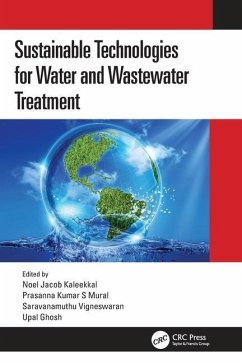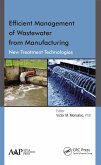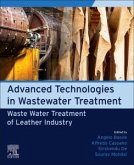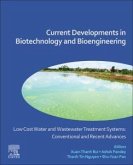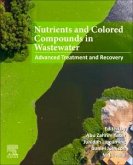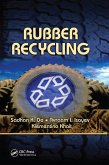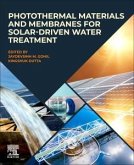Sustainable Technologies for Water and Wastewater Treatment
Herausgeber: Kaleekkal, Noel Jacob; Ghosh, Upal; Vigneswaran, Saravanamuthu; Mural, Prasanna Kumar S
Sustainable Technologies for Water and Wastewater Treatment
Herausgeber: Kaleekkal, Noel Jacob; Ghosh, Upal; Vigneswaran, Saravanamuthu; Mural, Prasanna Kumar S
- Broschiertes Buch
- Merkliste
- Auf die Merkliste
- Bewerten Bewerten
- Teilen
- Produkt teilen
- Produkterinnerung
- Produkterinnerung
This book discusses relevant sustainable technologies for water and wastewater treatment pertaining to nanoscale approach, membrane-based technologies, energy and water nexus, organic pollutants, nascent technologies, bio and bio-inspired materials for water reclamation and integrated systems and overview of wastewater treatment plants.
Andere Kunden interessierten sich auch für
![Efficient Management of Wastewater from Manufacturing Efficient Management of Wastewater from Manufacturing]() Efficient Management of Wastewater from Manufacturing110,99 €
Efficient Management of Wastewater from Manufacturing110,99 €![Advanced Technologies in Wastewater Treatment Advanced Technologies in Wastewater Treatment]() Advanced Technologies in Wastewater Treatment239,99 €
Advanced Technologies in Wastewater Treatment239,99 €![Low Cost Water and Wastewater Treatment Systems: Conventional and Recent Advances Low Cost Water and Wastewater Treatment Systems: Conventional and Recent Advances]() Low Cost Water and Wastewater Treatment Systems: Conventional and Recent Advances239,99 €
Low Cost Water and Wastewater Treatment Systems: Conventional and Recent Advances239,99 €![Nutrients and Colored Compounds in Wastewater Nutrients and Colored Compounds in Wastewater]() Nutrients and Colored Compounds in Wastewater239,99 €
Nutrients and Colored Compounds in Wastewater239,99 €![Rubber Recycling Rubber Recycling]() Rubber Recycling91,99 €
Rubber Recycling91,99 €![Photothermal Materials and Membranes for Solar-Driven Water Treatment Photothermal Materials and Membranes for Solar-Driven Water Treatment]() Photothermal Materials and Membranes for Solar-Driven Water Treatment239,99 €
Photothermal Materials and Membranes for Solar-Driven Water Treatment239,99 €![Innovative and Hybrid Advanced Oxidation Processes for Water Treatment Innovative and Hybrid Advanced Oxidation Processes for Water Treatment]() Innovative and Hybrid Advanced Oxidation Processes for Water Treatment188,99 €
Innovative and Hybrid Advanced Oxidation Processes for Water Treatment188,99 €-
-
-
This book discusses relevant sustainable technologies for water and wastewater treatment pertaining to nanoscale approach, membrane-based technologies, energy and water nexus, organic pollutants, nascent technologies, bio and bio-inspired materials for water reclamation and integrated systems and overview of wastewater treatment plants.
Hinweis: Dieser Artikel kann nur an eine deutsche Lieferadresse ausgeliefert werden.
Hinweis: Dieser Artikel kann nur an eine deutsche Lieferadresse ausgeliefert werden.
Produktdetails
- Produktdetails
- Verlag: CRC Press
- Seitenzahl: 398
- Erscheinungstermin: 25. September 2023
- Englisch
- Abmessung: 234mm x 156mm x 22mm
- Gewicht: 581g
- ISBN-13: 9780367552534
- ISBN-10: 0367552531
- Artikelnr.: 68714748
- Herstellerkennzeichnung
- Libri GmbH
- Europaallee 1
- 36244 Bad Hersfeld
- gpsr@libri.de
- Verlag: CRC Press
- Seitenzahl: 398
- Erscheinungstermin: 25. September 2023
- Englisch
- Abmessung: 234mm x 156mm x 22mm
- Gewicht: 581g
- ISBN-13: 9780367552534
- ISBN-10: 0367552531
- Artikelnr.: 68714748
- Herstellerkennzeichnung
- Libri GmbH
- Europaallee 1
- 36244 Bad Hersfeld
- gpsr@libri.de
Dr. Noel Jacob Kaleekkal is currently an Assistant Professor at the National Institute of Technology Calicut, India and also leads the Membrane Separation Group. He holds a Chemical Engineering undergraduate degree from the National Institute of Technology Karnataka, India. He obtained his postgraduate degree (Chemical Engineering) and Ph.D. (Technology) from Anna University, India. His research interests lie in the development of novel membranes for different applications His initial focus was on the development and evaluation of membranes for hemodialysis application. He has also worked on the pressure-driven membrane process for water treatment including removal of heavy metals, humic substances, separation of oil-water emulsion, etc. He has also co-authored peer-reviewed articles on proton exchange membranes for direct-methanol fuel cells. His most recent researches focus on low-pressure, novel membrane technologies that aim to address the concerns of diminishing water and energy resources. He has received funded projects for developing novel forward osmosis membranes as well as superhydrophobic membranes for Membrane Distillation for the recovery and reuse of wastewater and/or seawater. Dr. Prasanna Kumar S Mural has a bachelor's degree in Chemical Engineering from the National Institute of Technology Karnataka, India. He has completed his master's degree in Plastic Technology from CIPET, Bhubaneshwar, M.B.A in Total Quality Management from Sikkim Manipal and Ph.D. from the Indian Institute of Science, Bangalore, India. Currently he is serving as an assistant professor and leads the Materials Chemistry and Polymer Technology Research Group in the Department of Chemical Engineering at the National Institute of Technology Calicut, Kerala, India. His main focus of research was on the development and evaluation of antibacterial membranes for water purification applications. Dr. Prasanna Kumar has developed a unique one-step method of membrane preparation via polymer blends. He also authored a peer-reviewed article on antibacterial water purification membranes. Presently, his research involves the application of polymer nanocomposite for water and energy application to address the water and energy crisis. Prof. S. Vigneswaran is currently a Distinguished Professor of Environmental Engineering in the Faculty of Engineering and IT at the University of Technology, Sydney (UTS), Australia. He obtained his Doctor of Engineering and Dr.Sc from University of Montpellier and University of Toulouse respectively. During the last twenty-five years, he has made significant contributions to the understanding of membrane systems in water reuse and desalination. He has several national and international projects in this area. He is a Fellow of the International Water Association. He has published more than 300 journal papers (with a google scholar index of 60). He has authored and edited 3 books on filtration, water treatment and membrane processes. The latest book he authored and edited was "Membrane Technology and Environmental Applications" Zhang, T.C., Surampalli, R.Y., Vigneswaran, S., Tyagi, R.D., Ong, S.L., Kao, C.M. (2012). This book was sponsored by Membrane Technology Task Committee of the Environmental Council Environmental and Water Resources Institute (EWRI) of the American Society of Civil Engineers, ASCE Press, 2012, New York. In addition to that he was invited by UNESCO to write 2 volumes on "Water Recycle, Reuse and Reclamation" and "Waste-water Treatment Technologies". Dr. Upal Ghosh is a professor in the Department of Chemical, Biochemical, and Environmental Engineering at the University of Maryland Baltimore County. He has an undergraduate degree in Chemical Engineering and MS and Ph.D. degrees in Environmental Engineering. His group performs research in environmental engineering and science with a focus on the fate, effects, and remediation of toxic pollutants in the environment. They use multidisciplinary tools to investigate exposure and bioavailability of organic and metal pollutants to organisms and apply the new understanding to develop novel approaches for risk assessment and remediation. His research has contributed to the development and transition of novel sediment remediation technologies based on altering sediment geochemistry and enhancing biological degradation. Dr. Ghosh has also led the development of monitoring tools for pollutant bioavailability, especially work on passive sampling techniques for measuring freely dissolved concentrations in sediment porewater. His work has been published in the leading journals in the field and the technology development has led to several US patents. His research contributions have been recognized through multiple awards including the University System of Maryland Regents Award for Excellence in Scholarship, Research, and Creative Activity in 2016. He is an Associate Editor of the journal Environmental Toxicology and Chemistry. Dr. Ghosh also is the co-founder of two start-up companies that are transitioning emerging sediment remediation technologies to the field.
Part I Introduction
Chapter 1 In Situ Sampling Techniques for Identification and Quantification
of Trace Pollutants
Chapter 2 Occurrence and Removal of Endocrine Disruptor Chemicals in
Wastewater
Part II Membrane-Based Technologies
Chapter 3 Thin-Film Composites and Multi-Layered Membranes for Wastewater
Treatment
Chapter 4 Membrane Distillation: An Efficient Technology for Desalination
Chapter 5 Membrane Distillation for Wastewater Treatment
Chapter 6 Applications of Electrospun Membranes for Wastewater Treatment
Chapter 7 Forward Osmosis as a Sustainable Technology for Water Treatment
and Desalination
Part III Energy-Water Nexus
Chapter 8 Microbial Desalination Cells: Opportunities and Challenges
Chapter 9 Microbial Fuel Cell: A Potential Solution for Desalination
Chapter 10 Advanced Oxidation Techniques for Wastewater Treatment
Part IV Nascent Technologies
Chapter 11 Hydrodynamic Cavitation: A Novel Energy Efficient Technology for
Degradation of Organic Contaminants in Wastewater
Part V Bio and Bio-Inspired Materials for Water Reclamation
Chapter 12 Bioremediation and Phytoremediation as the Environmentally
Sustainable Approach for the Elimination of Toxic Heavy Metals
Chapter 13 Biopolymers as a Sustainable Approach for Wastewater Treatment
Chapter 14 Bioreactors for Degradation of Toxic Pollutant in Wastewater
System
Part VI Integrated Technologies for Water Treatment
Chapter 15 Sustainable Technologies for Recycling Greywater: A Shift
Towards Decentralized Treatment
Chapter 16 Advanced Membrane Bioreactor Hybrid Systems
Chapter 17 Development of MBR, MABR and AnMBR Systems for Wastewater
Treatment
Chapter 18 Membrane Hybrid System in Water and Wastewater Treatment
Index.
Chapter 1 In Situ Sampling Techniques for Identification and Quantification
of Trace Pollutants
Chapter 2 Occurrence and Removal of Endocrine Disruptor Chemicals in
Wastewater
Part II Membrane-Based Technologies
Chapter 3 Thin-Film Composites and Multi-Layered Membranes for Wastewater
Treatment
Chapter 4 Membrane Distillation: An Efficient Technology for Desalination
Chapter 5 Membrane Distillation for Wastewater Treatment
Chapter 6 Applications of Electrospun Membranes for Wastewater Treatment
Chapter 7 Forward Osmosis as a Sustainable Technology for Water Treatment
and Desalination
Part III Energy-Water Nexus
Chapter 8 Microbial Desalination Cells: Opportunities and Challenges
Chapter 9 Microbial Fuel Cell: A Potential Solution for Desalination
Chapter 10 Advanced Oxidation Techniques for Wastewater Treatment
Part IV Nascent Technologies
Chapter 11 Hydrodynamic Cavitation: A Novel Energy Efficient Technology for
Degradation of Organic Contaminants in Wastewater
Part V Bio and Bio-Inspired Materials for Water Reclamation
Chapter 12 Bioremediation and Phytoremediation as the Environmentally
Sustainable Approach for the Elimination of Toxic Heavy Metals
Chapter 13 Biopolymers as a Sustainable Approach for Wastewater Treatment
Chapter 14 Bioreactors for Degradation of Toxic Pollutant in Wastewater
System
Part VI Integrated Technologies for Water Treatment
Chapter 15 Sustainable Technologies for Recycling Greywater: A Shift
Towards Decentralized Treatment
Chapter 16 Advanced Membrane Bioreactor Hybrid Systems
Chapter 17 Development of MBR, MABR and AnMBR Systems for Wastewater
Treatment
Chapter 18 Membrane Hybrid System in Water and Wastewater Treatment
Index.
Part I Introduction
Chapter 1 In Situ Sampling Techniques for Identification and Quantification
of Trace Pollutants
Chapter 2 Occurrence and Removal of Endocrine Disruptor Chemicals in
Wastewater
Part II Membrane-Based Technologies
Chapter 3 Thin-Film Composites and Multi-Layered Membranes for Wastewater
Treatment
Chapter 4 Membrane Distillation: An Efficient Technology for Desalination
Chapter 5 Membrane Distillation for Wastewater Treatment
Chapter 6 Applications of Electrospun Membranes for Wastewater Treatment
Chapter 7 Forward Osmosis as a Sustainable Technology for Water Treatment
and Desalination
Part III Energy-Water Nexus
Chapter 8 Microbial Desalination Cells: Opportunities and Challenges
Chapter 9 Microbial Fuel Cell: A Potential Solution for Desalination
Chapter 10 Advanced Oxidation Techniques for Wastewater Treatment
Part IV Nascent Technologies
Chapter 11 Hydrodynamic Cavitation: A Novel Energy Efficient Technology for
Degradation of Organic Contaminants in Wastewater
Part V Bio and Bio-Inspired Materials for Water Reclamation
Chapter 12 Bioremediation and Phytoremediation as the Environmentally
Sustainable Approach for the Elimination of Toxic Heavy Metals
Chapter 13 Biopolymers as a Sustainable Approach for Wastewater Treatment
Chapter 14 Bioreactors for Degradation of Toxic Pollutant in Wastewater
System
Part VI Integrated Technologies for Water Treatment
Chapter 15 Sustainable Technologies for Recycling Greywater: A Shift
Towards Decentralized Treatment
Chapter 16 Advanced Membrane Bioreactor Hybrid Systems
Chapter 17 Development of MBR, MABR and AnMBR Systems for Wastewater
Treatment
Chapter 18 Membrane Hybrid System in Water and Wastewater Treatment
Index.
Chapter 1 In Situ Sampling Techniques for Identification and Quantification
of Trace Pollutants
Chapter 2 Occurrence and Removal of Endocrine Disruptor Chemicals in
Wastewater
Part II Membrane-Based Technologies
Chapter 3 Thin-Film Composites and Multi-Layered Membranes for Wastewater
Treatment
Chapter 4 Membrane Distillation: An Efficient Technology for Desalination
Chapter 5 Membrane Distillation for Wastewater Treatment
Chapter 6 Applications of Electrospun Membranes for Wastewater Treatment
Chapter 7 Forward Osmosis as a Sustainable Technology for Water Treatment
and Desalination
Part III Energy-Water Nexus
Chapter 8 Microbial Desalination Cells: Opportunities and Challenges
Chapter 9 Microbial Fuel Cell: A Potential Solution for Desalination
Chapter 10 Advanced Oxidation Techniques for Wastewater Treatment
Part IV Nascent Technologies
Chapter 11 Hydrodynamic Cavitation: A Novel Energy Efficient Technology for
Degradation of Organic Contaminants in Wastewater
Part V Bio and Bio-Inspired Materials for Water Reclamation
Chapter 12 Bioremediation and Phytoremediation as the Environmentally
Sustainable Approach for the Elimination of Toxic Heavy Metals
Chapter 13 Biopolymers as a Sustainable Approach for Wastewater Treatment
Chapter 14 Bioreactors for Degradation of Toxic Pollutant in Wastewater
System
Part VI Integrated Technologies for Water Treatment
Chapter 15 Sustainable Technologies for Recycling Greywater: A Shift
Towards Decentralized Treatment
Chapter 16 Advanced Membrane Bioreactor Hybrid Systems
Chapter 17 Development of MBR, MABR and AnMBR Systems for Wastewater
Treatment
Chapter 18 Membrane Hybrid System in Water and Wastewater Treatment
Index.

